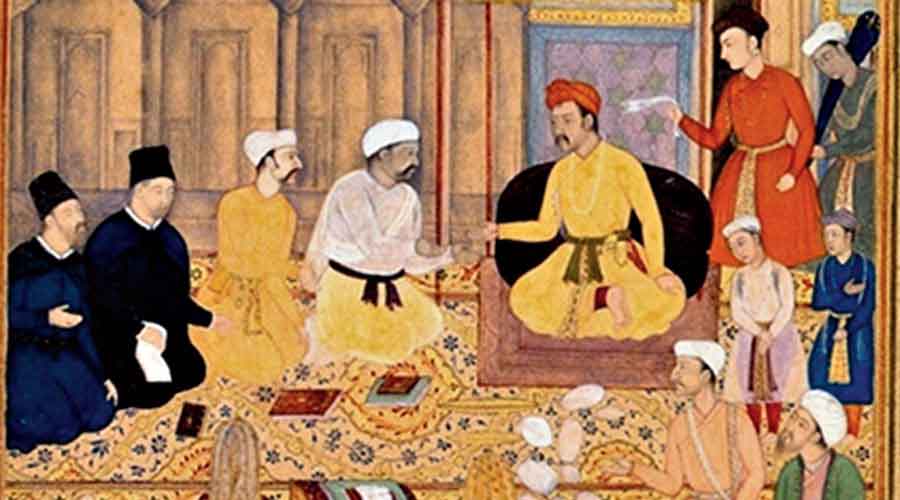
Article by
The first Jesuit mission of Aquaviva Monserrate ended in 1583, withdrawal of Aquaviva. In 1591 Emperor Akbar during his stay at Lahore ordered the Greek sub-deacon Dram Leo Gramon to appeal to Goa for sending a second mission to the sub-continent. On the wish of the Emperor and on appeal of the sub-deacon, the second mission consisted of Fr. Duarte Leite and Fr. Cristobel Deogo and Br. Estevo Reberio came to Punjab but after one year the mission went back.
The hopes of Akbar’s conversion which had been entertained at Goa, were grievously disappointed. A second mission sent in 1590 at the emperor’s urgent request was called in 1592 having affected nothing.
The third mission, also dispatched in compliance with a pressing invitation, arrived in 1595 at Lahore where the Court then resided, and became a more or less permanent institution, without its effect on secular politics. The leading members were Father Jerome Xavier and Father Emmanuel Pinherio. In 1594 the third mission headed by Fr. Jerome Xiever, who was the son of St. Francis Xavier’s brother. He paid full attention to evangelical work and with the blessing of Emperor Akbar increased the missionary activities. Fr. Jerome translated the Gospel and Acts in Persian. On 27th September 1597 the construction of Catholic Church was completed and in 1604 Emperor Akbar through a written Declaration permitted his subject Christianity. Meanwhile, more Jesuit Fathers came to Punjab from Goa. They published “Catechism” and published the History of the Church in Persian.
Their letters, of which many have been printed, are first class authorities for the letter part of Akbar’s reign. The missionaries, although they did not succeed in converting either the sovereign or his nobles. Both Akbar and his Prince Salim professed veneration for Virgin Mary and for Christian images. It is clear that the attention lavished on the priests was not the outcome of genuine religious fervor, but was dictated chiefly by the desire to secure Portuguese military help. Akbar in 1600 made special efforts to obtain the loan of the foreigners’ superior ordnance for siege of Asirgarh, which he could not branch with his guns; while the prince, meditating rebellion, and in reality indifferent to religion, was equally eager to enlist their aid against his father. In 1601 Akbar sent a final embassy to Goa without any pretense of seeking religious instruction, but got satisfaction from the wily Goan authorities, who understood the game perfectly. The Jesuits on their part combined patriotic politics with missionary zeal and acted as unofficial agents of the Portuguese Government, or rather of the Government of Spain, with which Portugal was then united. Their considerable influence is attested by the report of an Englishman, John Mildenhall, who, seeking trading facilities, visited Akbar in the last years of his life.
There was great influence of Fr.Jerome Xavier on emperor Jehangir. The temporary alienation of Jehangir from the Jesuits Fathers ceased in 1606 when his favours to priests were renewed. After some difficulty they were allowed to retain their elegant and commodious (elegans et scitum) Church at Lahore, as well as the collegium, or priests residence at Agra. When Jehangir was on his way to Kabul, he took the Persian version of the Gospels and permitted the Fathers to act publicly with as much liberty as if they were in Europe. When the emperor returned to Agra he took two priests with him, leaving one at Lahore to take after the congregation there. Church processions with full Catholic ceremonial were allowed to parade the streets, and cash allowances were paid from the treasury for church expenses and support of the converts. The zeal for Islam, which Jehangir had displayed in beginning of his reign gradually, diminished, and he openly declared that he wished to follow his father’s footsteps. Out of his eighteen wives, seven were Hindus.
 Monthly "Azeem English Magazine", launched in 2000, records the information about diverse fields like mental health, literature, research, science, and art. The magazine's objective is to impart social, cultural, and literary values to society.
Monthly "Azeem English Magazine", launched in 2000, records the information about diverse fields like mental health, literature, research, science, and art. The magazine's objective is to impart social, cultural, and literary values to society.
+92 51 88 93 092
First Floor, RAS Arcade, Eidhi Market, Street#124, G-13/4, Islamabad, Pakistan, 44000.